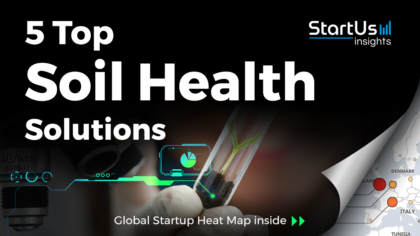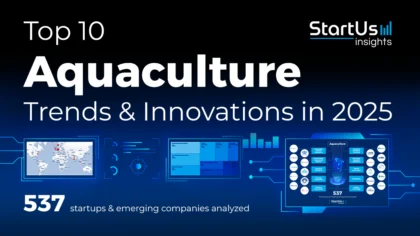Accelerate Productivity in 2025
Reignite Growth Despite the Global Slowdown
Staying ahead of the technology curve means strengthening your competitive advantage. That is why we give you data-driven innovation insights into the agriculture sector. This time, you get to discover 5 hand-picked startups developing soil health solutions.
Global Startup Heat Map highlights 5 Top Soil Health Solutions out of 551
The insights of this data-driven analysis are derived from the Big Data & Artificial Intelligence-powered StartUs Insights Discovery Platform, covering 2 093 000+ startups & scaleups globally. The platform gives you an exhaustive overview of emerging technologies & relevant startups within a specific field in just a few clicks.
The Global Startup Heat Map below reveals the distribution of the 551 exemplary startups & scaleups we analyzed for this research. Further, it highlights 5 AgriTech startups that we hand-picked based on criteria such as founding year, location, funding raised, and more. You get to explore the solutions of these 5 startups & scaleups in this report. For insights on the other 546 soil health solutions, get in touch.
stenon provides Real-Time Soil Analysis
Maintaining soil quality allows farmers to sustain agricultural productivity while protecting the environment. Agronomists measure various soil health parameters, including biomass, nitrogen levels, and temperature to determine soil conditions. However, conventional systems do not offer real-time data critical for soil management and optimizing agricultural operations such as irrigation and fertilizer application. That is why startups develop soil monitoring solutions that generate soil data in real-time.
stenon is a German startup that advances on-demand real-time soil analysis. The startup’s device combines sensors for soil health analysis along with a touchscreen and an ergonomic grip. Farmers insert the sensor into the soil and receive immediate soil analysis results on the screen, making the process laboratory-independent. Additionally, the sensors detect general soil parameters like temperature, moisture, and pH value, along with nutrient compositions such as phosphorus and potassium content. stenon’s solution also provides fertilizer recommendations, field mapping, and soil development data.
MyLand Agriculture offers Soil-as-a-Service
Bacteria and fungi are at the base of the soil food web, which impacts aboveground and belowground agricultural processes. These organisms break down organic matter, thereby releasing essential nutrients for plant growth. However, the extreme use of chemicals and monoculture decreases the biomass quantity in topsoil, increasing soil erosion risks. This is why startups offer solutions that enable regenerative and organic cultivation methods which improve soil health.
US-based startup MyLand Agriculture offers soil-as-a-service to improve soil health for regenerative farming. The startup extracts and isolates native microalgae from soil samples as well as installs MyLand System, an on-site solution to multiply the selected algae strain, on the farm that uses existing irrigation systems to distribute the microalgae. This allows food growers to improve soil quality by increasing the soil organic matter, porosity, water holding capacity, and aggregation.
Cloud Agronomics enables Soil Monitoring
Crop irrigation consumes a massive proportion of the total freshwater supply along with high energy expenditure. Due to depleting water resources, the agriculture sector now optimizes its water consumption, also saving energy in the process, for a sustainable economy. For this, growers monitor soil moisture and salinity levels that provide a better understanding of irrigation requirements. This enables precision agriculture, thereby reducing agricultural operational costs.
US-based startup Cloud Agronomics provides soil condition monitoring for agricultural applications. The startup combines satellite-based hyperspectral imaging, historical data, and machine learning to track soil carbon stock and nutrients. This allows farm owners to quantify soil organic matter in topsoil and subsoil, as well as identify water runoff and evaluate restorative agriculture practices.
Soil Carbon advances Microbial Carbon Sequestration
Intensive agriculture practices use huge amounts of chemical fertilizers and pesticides, damaging soil microbiota critical for maintaining soil carbon levels. Soil health degradation due to over-farming also impacts its carbon sequestration ability, further accelerating climate change. Therefore, farmers now practice climate-positive agricultural methods to tackle these issues. Besides, it improves soil quality, reduces water and nutrient runoff, while producing increased and healthier yields.
Soil Carbon is an Australian startup that enables microbial carbon sequestration. The startup’s endophytic fungi convert simple sugars from plants to stable carbon. These endophytes also benefit plant growth, improve fertility, and provide protection against disease and drought stresses. Additionally, it lasts longer in the soil and forms micro-aggregates since stable carbon replaces labile carbon compounds. As a result, Soil Carbon’s solution further provides extra income for farmers via carbon trading markets.
Terra Agro Biotech facilitates Soil Regeneration
The soil nutrient cycle is an integral part of agriculture and has a tremendous impact on the yields. In addition, soil organic matter stores several plant nutrients such as nitrogen, phosphorus, and sulfur required for the nutrient cycle. However, there is a reduction in soil biomass quantity due to natural and anthropogenic factors. To this end, startups render sustainable and organic means to replenish biomass and nutrients, improving soil health and reducing dependence on chemicals for plant nutrition.
Terra Agro Biotech is an Indian startup that facilitates organic agricultural practices. The startup’s biofertilizers and biopesticides improve the porous nature and water holding capacity of the soil as well as its regenerative property. This further advances soil quality and reduces harmful algal blooms and water pollution in nearby water bodies, thereby reducing the overall carbon footprint of large farms.
Discover more AgriTech Startups
AgriTech startups such as the examples highlighted in this report focus on soil quality, regenerative and organic agriculture as well as sustainability. While all of these technologies play a major role in advancing the agricultural industry, they only represent the tip of the iceberg. To explore more agricultural technologies, simply get in touch to let us look into your areas of interest. For a more general overview, you can download our free AgriTech Innovation Report to save your time and improve strategic decision-making.








